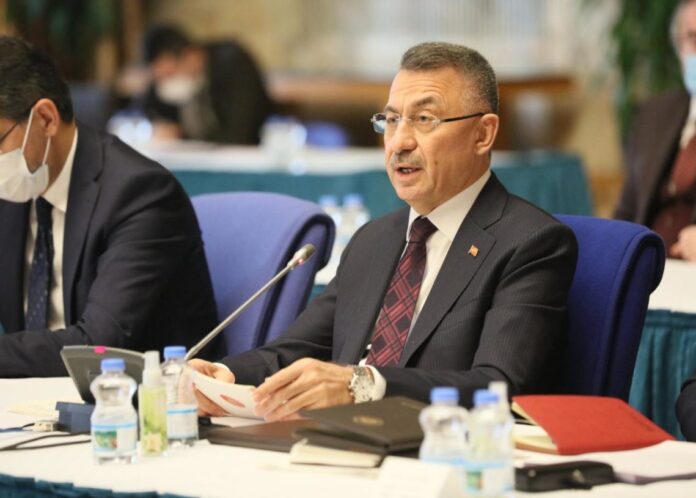Turkey’s vice president last week stated that its National Intelligence Organization (Milli İstihbarat Teşkilatı, MİT) played an active role in the Nagorno-Karabakh war in 2020, helping to shape the balances in the field.
Vice President Fuat Oktay made a presentation on the annual activities of state institutions operating under the Presidency at parliament’s Planning and Budget Committee on November 26. Stating that MİT is a source of pride for the country, Oktay told deputies that the organization renders great service to Turkey’s interests with the operations it carries out abroad.
“In many regions such as Syria, Libya, Upper Karabakh and most recently Afghanistan, the organization has carried out important work that protects our national interests and shapes the balances in the field in favor of our country, in line with our state policy,” he said. “We have not only carried out the most successful operations in our history against terrorist organizations at our borders and just beyond but have also achieved many successes, from Karabakh to the struggle for legitimacy in Libya against the putschists. We are progressing and demonstrating our concrete achievements one by one.”
It is no secret that Turkey supported its ally Azerbaijan militarily, but no official statement has ever been made regarding the involvement of Turkish intelligence in the war. On the contrary, it was persistently denied that MİT took any initiatives regarding the war zone, the biggest reason being an accusation that MİT transferred jihadist fighters under its control in Syria to Nagorno-Karabakh.
Head of the Russian Foreign Intelligence Service Sergey Naryshkin had previously mentioned the Turkish intelligence agency in Nagorno-Karabakh, saying, “We know the work of Turkish intelligence, and we see certain elements of its work,” on November 6, 2020, during a TV interview, as reported by the Tass news agency.
He also claimed that Moscow had obtained confirmed intelligence about the participation of Syrian mercenaries on the battlefield, referring implicitly to the accusation about MİT.
“We have precise information about the presence of terrorists in the combat zone in the Karabakh region, from the Middle East, and from Syria primarily,” Naryshkin said.
Armenia continuously claims that foreign fighters were brought from Syria and Libya through Turkish intelligence and that they committed war crimes. Nordic Monitor has learned that Armenian diaspora organizations continue to investigate which MİT agents took part in the conflict last year as part of efforts to file a war crimes complaint about Turkey and Azerbaijan with the International Criminal Court.
Following the war, Turkey and Azerbaijan took concrete steps to improve relations in the military and intelligence fields. The two countries in June signed a protocol known as the Shusha Declaration, emphasizing the military cooperation between them as well as Turkey’s commitment to Azerbaijan’s territorial integrity. According to the text signed by the countries’ presidents, if a third state or states carries out attacks or threats against one of the two parties, the countries will jointly take appropriate initiatives and assist each other militarily to prevent that threat or attack, moving Turkey’s aid and support to a more legitimate ground.
Meanwhile, in the bill for the 2022 budget, a total of 3.5 billion lira is allocated to MİT.
Nordic Monitor previously reported that MİT spent nearly half a billion Turkish lira in secret operations in 2020 while enjoying a huge spike in the assets it holds, valued at more than 32 billion lira.
According to the August 2021 audit report by the Court of Accounts, a copy of which was obtained by Nordic Monitor, MIT spent 495.4 million Turkish lira in what was described as “secret service expenditures.” What is more, the assets it holds jumped to 32.7 billion lira, a whopping increase of 92 percent compared to the previous year. It should also be noted that MİT secretly uses a large amount of money from discretionary funds given to the president.
















